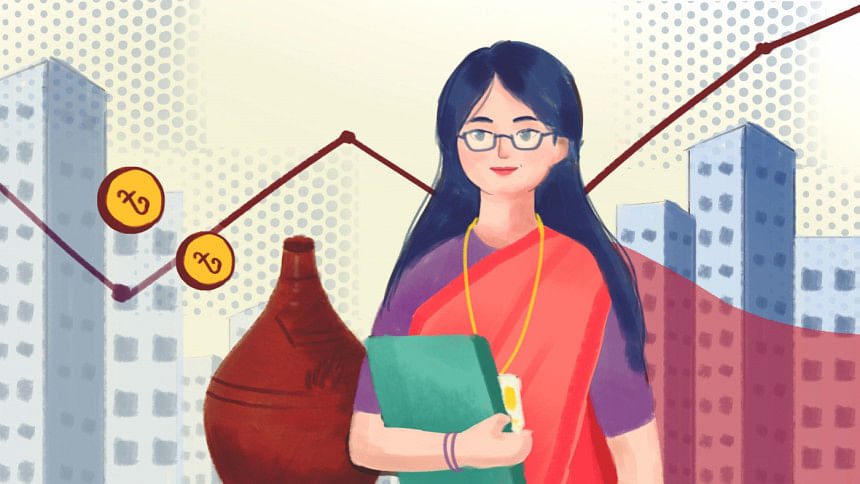Invest in women to accelerate progress

At the current rate of progress, it will take another 300 years to reach full gender equality. It is estimated that, globally, an additional $360 billion is needed annually to achieve SDG 5 on gender equality and women's empowerment. And in the meantime, women's rights are increasingly coming under threat or being rolled back. That is why the theme for this year's International Women's Day—"Invest in Women: Accelerate Progress"—is so important.
Successful investments in women have already been made in Bangladesh. The number of women in the labour force increased to close to 43 percent in 2022, up from 36 percent five years before. Women are better educated despite the many challenges. Girls are more likely than ever to go to school, and women are more likely than ever before to survive childbirth, thanks to large-scale investments in education, healthcare, and efforts to end child marriage.
Unfortunately however, large gaps remain in ensuring the meaningful representation of women. Women own less than 1.7 percent of enterprises in the formal sector, and only seven percent of all the agricultural land in Bangladesh. The Sustainable Development Goals cannot be achieved without the leadership of women in the social, economic, and political realms. The barriers to progress, including discriminatory social norms and unequal power relations, need to be addressed.
We have seen the impact of this inequality firsthand on recent field visits to Rangpur, Khulna, and Barishal. In our many conversations with women often at the bottom of the social and economic ladder, they clearly expressed their dreams and aspirations. They want access to decent jobs where they are protected from discrimination and harassment. They want education for their daughters, and opportunities equal to those of their sons.
So, what does investment in women really look like?
Public and private investments need to be geared towards women's empowerment. Realising women's rights is not only a moral imperative, but also a smart economic investment. When women earn an income and control their earnings, their children are more likely to attend school, their families are healthier, their self-worth improves, and their household incomes grow—along with the economy.
Strengthening the social care infrastructure in Bangladesh will reduce unpaid care work by women and create decent work opportunities. Prime Minister Sheikh Hasina has prioritised an initiative to introduce daycare facilities across Bangladesh, and this is another important step to allow women's continued representation in the workforce, and ultimately to allow women to take on more leadership roles.
Policies are needed that will improve women's socioeconomic status. Equal inheritance rights and women-only spaces in markets for example will allow women to actively participate in the workforce, invest in their family land, and care for their families. Efforts already underway in Bangladesh to amend the law on domestic violence and to introduce a law on sexual harassment are extremely encouraging.
The government, civil society, and local leaders need to come together to step up action on gender equality. Ensuring women are considered when allocating climate financing, or when providing capital to socially excluded groups will strengthen communities' ability to deal with economic shocks and the climate crisis.
Finally, a change in social norms is needed. Women want to be able to use public transportation without fear; they want equal access to resources and technology, and they want health and sanitation facilities that take their needs into account. They want to live dignified lives free of violence.
At the household level, within communities, in educational and religious institutes, and within workspaces, efforts and investments are needed to change mindsets and give women the opportunity to thrive. Encouraging men and boys to value and understand the importance of economic and education opportunities for women and girls is the foundation of true change.
The United Nations in Bangladesh is fully committed to support grassroots and women-led movements. We must hear women's voices and support women's rights. The UN has made a commitment to work towards gender parity within our workforce and commit that all joint programming in Bangladesh prioritises gender equality. Commitment to women's empowerment means little if it is not backed up by resources. Investing in women and girls sets a direct path towards gender equality, sustainable development, and inclusive economic growth.
Gwyn Lewis is UN resident coordinator, Gitanjali Singh is UN Women country representative and Kristine Blokhus is UNFPA country representative.
Views expressed in this article are the author's own.
Follow The Daily Star Opinion on Facebook for the latest opinions, commentaries and analyses by experts and professionals. To contribute your article or letter to The Daily Star Opinion, see our guidelines for submission.

 For all latest news, follow The Daily Star's Google News channel.
For all latest news, follow The Daily Star's Google News channel. 










Comments